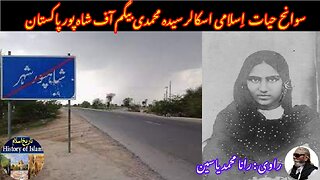Premium Only Content

Were Sectarian conflicts in reign 26th Caliph Al-Qaim القائم کے دور حکومت میں فرقہ وارانہ تنازعات
@islamichistory813 #CaliphateHistory #AlQaim #SectarianIssues
Were Sectarian conflicts in reign Al-Qaim 26th Caliph of Abbasid Caliphate?
Dekhti aankhon aur suntay kanon ko Asslamoalaikum, sisters brothers friends and elders In this informative video, we examine the sectarian conflicts that characterized the reign of Al-Qaim, the 26th Caliph of the Abbasid Caliphate. Through a detailed exploration of historical records and scholarly interpretations, we aim to shed light on the causes and consequences of these conflicts. We are describing how these divisions influenced the governance and stability of the Abbasid Caliphate during this tumultuous period.
After al-Basasiri died and his revolt came to an end, the Seljuks were left as the single dominant power over al-Qa'im's caliphate. They were similar to the Buyids in this regard, although the Sunni Seljuks were more closely aligned with al-Qa'im in religious matters. Sectarian conflict was a prominent issue during this part of al-Qa'im's reign. A notable incident concerned the opening of the Nizamiyya of Baghdad, a madrasa affiliated with the Shafi'i legal school, in 1067; its opening inflamed tensions with the Hanbalis. Al-Qa'im was reluctant to act without first consulting with the Seljuk sultan and was ultimately unable to control the situation.
Fakhr ad-Dawla Muhammad ibn Muhammad ibn Jahir was appointed as vizier by al-Qa'im in 1062. Fakhr ad-Dawla arrived and was "showered with gifts, robes of honor, and the title Fakhr ad-Dawla ('glory of the dynasty')." According to Sibt ibn al-Jawzi, he was also given the additional title Sharaf al-wuzara'.
Fakhr ad-Dawla's first tenure lasted until 1068, when he was dismissed for a series of "infractions" (dhunub) he had committed. The reasons included "his presence in the B?b al-Hujra (Privy Chamber) without permission, and his wearing of 'Adud ad-Dawla's ceremonial robes."[ In other words, he had been acting above his station. According to the diary of Abu Ali ibn al-Banna, the dismissal was on Tuesday, 9 September 1068. Fakhr ad-Dawla was "despondent and apologetic" and "acquiesced in tears". He was escorted out of Baghdad on Thursday night (11 September) and ended up traveling to the court of the Banu Mazyad ruler Nur ad-Dawla Dubays.[ Sibt ibn al-Jawzi and Abu Ali ibn al-Banna say this was at al-Hillah, while Ibn al-Athir and al-Bundari say it was at Fallujah instead] His belongings were later sent to him.
The competition to replace Fakhr ad-Dawla as vizier was fierce. Three different candidates were seriously considered, but none of them successfully took office as vizier. The caliph's initial choice was Abu Ya'la, father of Abu Shuja al-Rudhrawari, but he died on 11 September - before Fakhr ad-Dawla had even left Baghdad. Another early front-runner was the za'im Ibn Abd ar-Rahim, who was sent a letter to inform him of his selection to the vizierate before someone brought his sordid past to the caliph's attention: he had been part of al-Basasiri's entourage during his rebellion in 1058, and he had taken part in looting the caliph's palace and "attacking" the women of the harem.[ The sources don't specify if this was sexual violence or just plain violence] His name was immediately removed from contention. At this point, around mid-late November, Ibn al-Banna wrote that a rumor had started to go around that al-Qa'im would reinstate Fakhr ad-Dawla as vizier. At some point, another candidate, a Hanbali named Abu'l-'Ala', was considered, but he never took office.
Meanwhile, Nur ad-Dawla Dubays had been making "entreaties to the caliph" on Fakhr ad-Dawla's behalf. Eventually, Fakhr ad-Dawla was brought back to serve as vizier. A group of administrative officials went out to meet with him on Sunday, 7 December, in advance of his return to Baghdad. Ibn al-Banna's diary gives the date of his reentry to Baghdad as Wednesday, 10 December 1068. Crowds came to watch and he was "met by the troops, the courtiers, and the leading figures". Vizieral robes of honor were made ready for him on 29 December, and they were bestowed upon him on Wednesday, 31 December. People went to congratulate him the next day. Then on Friday, 2 January 1069, he went on horseback to the Jami al-Mansur in the robes of honor; again, crowds gathered to see him, and in some places they "sprinkled" coins on him.
Al-Qa'im does not seem to have held a grudge against Fakhr ad-Dawla and entrusted him and his son Amid ad-Dawla with a wide range of duties. Sometime around 1071, there was a "diplomatic fracas" between Fakhr ad-Dawla and the Seljuk administration involving a delay in exchanging robes of honor. When Alp Arslan died in 1072, the Banu Jahir were tasked with overseeing the official mourning as well as the ceremonial exchange of loyalty and robes of honor between al-Qa'im and the new Seljuk sultan Malik-Shah I.On 26 September 1073, Fakhr ad-Dawla oversaw the signing of the controversial Hanbali scholar Ibn Aqil's public recantation of his beliefs at the caliphal chancery. This document of retraction is the only one of its kind to survive in full from the middle ages to the present day; the episode marked the ascendancy of traditionalism in Baghdad in the 11th century.
During this and the previous caliphs' period, literature, especially Persian literature, flourished under the patronage of the Buwayhids. The famous philosopher al-Farabi died in 950; al-Mutanabbi, acknowledged in the East as the greatest of Arabic poets, and himself an Arab, in 965; and the Persian Abu Ali Husayn ibn Abdallah ibn Sina (Avicenna) in 1037.
In 1058 in Bahrain, a dispute over the reading of the khutba in Al-Qa'im's name between members of the Abd al-Qays tribe and the millenarian Ismaili Qarmatian state prompted a revolt led by Abu al-Bahlul al-Awwam that threw off Qarmatian rule and led to the unravelling of the Qarmatian state which finally collapsed in al-Hasa in 1067.
Friends sisters brothers tomorow we will be described Family of Al-Qaim 26th Caliph of Abbasid Caliphate. So permission for upto tomorow. Allah Hafiz
==============================
-
 8:20
8:20
ISLAMIC HISTORY
2 days agoIslamic Women Scholar Syeda Mohammadi Begum सैयदा मोहम्मदी बेगम سیدہ محمدی بیگم کی سوانح حیات
4 -
 LIVE
LIVE
Barry Cunningham
2 hours agoPRESIDENT TRUMP SPEECH AT MAKING HEALTH TECHNOLOGY GREAT AGAIN! EVENT AND MORE NEWS!
2,105 watching -
 DVR
DVR
The Officer Tatum
2 hours agoLIVE: Left CANCELS Their Own, All White Town, NYC Shooter Update + MORE | EP 146
1.97K -
 1:23:27
1:23:27
Redacted News
2 hours agoBREAKING! FBI DIRECTOR DROPS BOMBSHELL, REVEALS HIDDEN 'BURN BAGS' AND MISSING EPSTEIN FOOTAGE
113K69 -
 DVR
DVR
vivafrei
3 hours agoJoey Swoll CANCELS Himself! Oprah Closing Roads for Tsunami Evacuees? Canada Can't Find Criminals?
61K19 -
 1:47:35
1:47:35
Right Side Broadcasting Network
5 hours agoLIVE REPLAY: President Trump Delivers Remarks on Making Health Technology Great Again - 7/30/25
48.4K13 -
 38:23
38:23
Members Club
2 hours ago $0.11 earnedShooter Strikes NYC, WNBA Wig Meltdown, and Sweeney’s Jeans Go Viral - MC05
2.73K2 -
 33:41
33:41
The Finance Hub
4 hours ago $0.49 earnedBREAKING: NANCY PELOSI JUST GOT HIT WITH A MAJOR BOMBSHELL!!!
5.59K4 -
 LIVE
LIVE
LFA TV
21 hours agoLFA TV ALL DAY STREAM - WEDNESDAY 7/30/25
1,260 watching -
 2:04:14
2:04:14
Pop Culture Crisis
3 hours agoOprah Tsunami BACKLASH, Billie Eilish RACIST? Joey Swoll BENDS THE KNEE | Ep. 888
22.3K4